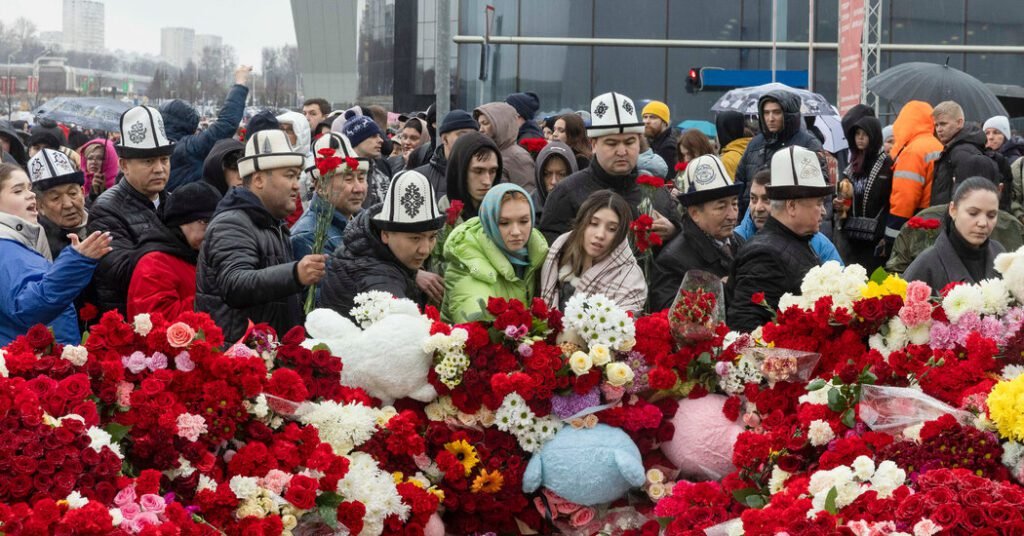Bodies were recovered, flowers were laid and fingers were pointed Sunday as competing narratives took shape over who was behind the terror attack on a Russian concert hall that killed at least 137 people enjoying a night of music.
President Vladimir V. Putin hinted that Ukraine was behind the attack on Friday night. He stopped short of blaming Kiev directly, but on Sunday, some of his allies showed no such dismay.
US officials said the attack appeared to be the work of an Islamic State affiliate and that there was no evidence linking Kiev to it. But many Russian nationalist commentators and ultraconservative hawks promote the idea that Ukraine is the obvious culprit.
A pro-Kremlin analyst who is a regular on Russian state television, Sergei A. Markov, wrote in a Telegram post that the Kremlin should work to isolate the Ukrainian leadership “by linking terrorist action not to ISIS but to Ukrainian government. as much as possible”.
Russian state news agencies barely reported that ISIS itself claimed responsibility for the attack on Crocus City Hall, a concert venue on the outskirts of Moscow. The ISIS offshoot US officials believe is linked to the attack, the Islamic State Khorasan, known as ISIS-K, operates in Pakistan, Afghanistan and Iran.
Late Sunday, four men who appeared to have been badly beaten appeared in a courtroom in Russia and were charged with carrying out a terrorist attack.
Three of the men told the court they were from Tajikistan, and according to Russian news agencies, the fourth suspect is as well. Islamic State has drawn thousands of followers from Central Asian countries, including Tajikistan.
All four suspects had visible bruises and one had bandages on his head. Another had to be led in and out of the courtroom. Videos purportedly showing the men being tortured during interrogation have been widely circulated on Russian social media.
On Sunday, a spokeswoman for the Russian Foreign Ministry, Maria V. Zakharova, said the West was pointing to ISIS-K to shift blame away from Ukraine. Russia has presented no evidence of Ukrainian involvement, and Ukrainian officials have rejected the accusations.
So does the Biden administration.
“There is absolutely no proof — and, in fact, what we know is that ISIS-K is actually responsible for what happened,” Vice President Kamala Harris said Sunday on ABC’s “This Week.” “
Reactions to the attack partly reflect the state of unease Russia has been living in since its forces invaded Ukraine.
For the past two years, the propaganda media has been racing to push one narrative, conspiracy theory or piece of speculation after another, and now some analysts and Kremlin critics say Mr. Putin may be falsely pinning the attack on Kiev for to justify another escalation. war.
On Saturday, Mr Putin vowed to punish the perpetrators — “whoever they are, whoever sent them”. He made no mention of ISIS-K.
Russia observed a national day of mourning on Sunday for the victims of the fire attack.
Under a gray sky, stunned Russians came to lay flowers and light candles at a memorial set up outside the concert hall. Dozens of people waited in a long line for their turn, many holding red bouquets, as work continued inside the hall to remove the remains of the tent. Flags were flown at half-mast on buildings across the country and state media published a video of Mr Putin lighting a memorial candle in a church.
A top Russian law enforcement body, the Investigative Committee, said on Sunday that 137 bodies had been recovered from the charred facilities, including three children. He said 62 victims have been identified so far and that genetic testing is underway to identify the rest. Many of the more than 100 people injured in the attack were in critical condition.
The names of the men described as the four main suspects were released as they were brought to court to face charges. A court spokesman identified them as Dalerjon Mirzoyev, 32. Saidakrami Rachabalizoda, 30; Shamsidin Fariduni, 25; and Muhammadsobir Fayzov, 19.
With Russia reeling from its worst terror attack in more than two decades, it wasn’t just Ukraine that came under scrutiny. Some commentators criticized Russian security services for failing to prevent the tragedy, and there were open questions about whether Russia had adequately acted on a warning from the United States about the threat of attack.
Conspiracy theories abounded.
Hard-line anti-Kremlin activists, speaking from abroad, speculated that the Russian state could orchestrate the attack to blame Ukraine or further tighten the screws on repression at home.
Some lawmakers in the House were already arguing that the government should get tough on immigrants. Lawmakers also pledged to debate whether the death penalty should be imposed in Russia.
Aleksei Venediktov, a Russian journalist and commentator and former editor of the influential radio station Ekho Moskvy, said that “different political forces are starting to use” the attack. “The Kremlin, above all,” he said in an interview broadcast on YouTube. “But also others, who say that everything was organized by the Kremlin.”
Some nationalist activists said disorientation could have been the attackers’ ultimate goal.
Yegor S. Kholmogorov, a Russian nationalist commentator, wrote on his blog on the Telegram messaging app that Russian society was “intensely united by the war and President Vladimir V. Putin’s election victory” before the attack. Now, he lamented, Russia has turned into a “society that is divided.”
As Russia mourned, the war in Ukraine continued.
Ukraine’s air force said it shot down 43 of 57 Russian missiles and drones fired overnight at various parts of the country. And Ukraine’s military said it hit two large amphibious ships that were part of Russia’s Black Sea fleet. There was no immediate comment from Russian military officials.
Neil MacFarquhar and Matthew Boke Big contributed to the report.

